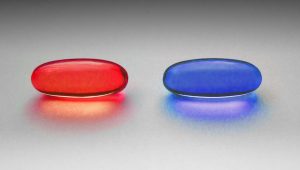
Risperidone was one of the first “atypical” antipsychotics to appear in the early 1990s. As a serotonin/dopamine receptor antagonist, it binds to D2 and D3 receptors with 50 and 20 times greater affinity than clozapine and is only 2-3 times less potent than haloperidol (Leyson et al, 1994).
In 2007, risperidone became off license and has emerged as the new standard care comparator for schizophrenia. Much of the current evidence for the use of risperidone is based on comparisons to older drugs with poor side effect profiles, such as haloperidol (Hunter et al, 2003).
However, comparing risperidone to other antipsychotics underestimates the importance of the placebo effect. With placebo effects accounting for up to 33% of clinical improvement (Benson and Friedman, 1996), many researchers feel that only by comparison to placebo can a rationalised therapeutic approach be developed (Vallance, 2006).
Cochrane reviews to date have evaluated the efficacy of risperidone for schizophrenia by comparing it with “typical” and other “atypical” antipsychotics. The subject of today’s blog is a Cochrane review (Rattehalli et al, 2016) that compares the efficacy of risperidone to that of placebo.

This Cochrane review aimed to determine the clinical effects and safety of risperidone compared with placebo for people with schizophrenia.
Methods
Searches were conducted in the Cochrane Schizophrenia Group’s trial register, which is the best place in the world to find schizophrenia trials. Studies were included that had been published up to October 2015.
All randomised controlled trials (RCTs) comparing oral risperidone with placebo treatments for people with schizophrenia or schizophrenia-like psychoses were included. All references of reports for included trials were also searched for further relevant studies. Participants were over the age of 17 with schizophrenia or other types of schizophrenia-like psychoses.
Results
In total, 763 citations were identified (after removal of duplicates). Fourteen studies with 24 references were awaiting further assessment due to lack of reviewer agreement and/or lack of full-text. One study was still ongoing. Overall this resulted in 15 studies with 56 references and 2,428 participants being included in the data and analysis.
The main findings of this review comparing risperidone with placebo for schizophrenia were:
- Patients in the risperidone group were more likely to achieve a significant clinical improvement (36% risk reduction in not achieving clinically significant improvement in psychotic symptoms). This effect was still present even when 3 studies were removed due to a high attrition rate
- Patients receiving risperidone were more likely to have shown a significant improvement on the clinical global impression scale (Guy, 1976)
- The risperidone group achieved a greater reduction on the brief psychiatric rating scale (Overall and Gorham, 1962) and on the positive and negative syndrome scale (Kay et al, 1968)
- The risperidone group were less likely to leave the study early
- The incidence of side effects was significantly higher in the risperidone group, with the risperidone group 1.56 times more likely to experience extrapyramidal side effects (1.56), akathisia (2.58), hypertonia (2.98) and parkinsonism (7.64)
Conclusions
This Cochrane review has shown that overall risperidone has a positive effect on the metal state of people with schizophrenia, however the data on which this is based is of low quality.
In particular, mental state and global state outcomes favoured risperidone, however when used alone the relationship between these measures and meaningful clinical improvement is unclear.
It is also concerning that while clinicians and patients may be reassured by the side effect profile of risperidone compared to “typical” antipsychotics, when compared to placebo the incidence of side effects in risperidone is significantly greater. Even more concerning is that due to poor reporting, the adverse effects of risperidone compared to placebo could be under estimated.
In conclusion, this Cochrane review shows that there is low quality evidence that supports the efficacy of risperidone compared to placebo. However, based on the same low quality evidence, it is unclear if the benefits of treatment outweigh the harm.
At present there is insufficient evidence from this review to support the use of risperidone over placebo. More independent, high quality and longer duration RCTs are required in order to allow clinicians and patients to be confident in the evidence for the use of risperidone in the treatment of schizophrenia.
Strengths and limitations
- Overall, the quality of evidence was poor
- Pharmaceutical companies funded 8 of the 15 studies
- Although all studies were reported as randomised, the method of randomisation was not always clear which could potentially lead to selection bias. Indeed the reviewers had concerns about sequence generation and allocation concealment in over half the included studies
- All studies were reported to be double blind, but again how this was achieved wasn’t always described, which made the assessment of observation bias by the authors difficult
- Some studies did not consider the analysis of data from participants who left the study early leaving them at high risk of attrition bias
- The authors also highlighted the issue of multiple publications and the risk of bias that this brings, with a large number being identified during this study
- In addition to the risk of different forms of bias in many studies, much of the data could not be used due to poor reporting.
The authors highlight that in addition to low quality data the applicability of the review is also limited. All of the 15 studies included were of short duration (between 8 and 16 weeks), thus the results of this review cannot be applied to the long term use of risperidone. Also, while studies were conducted in both primary and secondary care settings, most were conducted in high income countries. Thus the application of the findings outside these settings is limited.
Summary
- The atypical antipsychotic risperidone has emerged as the new standard care comparator for new therapeutics in schizophrenia despite a lack of evidence demonstrating superior efficacy when compared to placebo
- This Cochrane review shows that, based on the evidence available, risperidone has greater efficacy in causing clinical improvements in patients with schizophrenia compared to placebo
- However, the incidence of side effects, including extrapyramidal symptoms, in patients in the risperidone group are significantly greater than those in the placebo group
- In addition, the quality of evidence is poor, meaning that based on the evidence available, it is unclear if the benefits of risperidone outweigh the risks
- At present there is insufficient evidence to support the use of risperidone over placebo
- Further, independent and high quality research is needed in this area. Future RCTs must be of longer duration and be well planned, well conducted and well reported in order to provide a solid evidence base for the treatment of schizophrenia.

This review suggests that there is insufficient evidence to support the use of risperidone over placebo in schizophrenia.
Links
Primary paper
, , , , , . Risperidone versus placebo for schizophrenia. Cochrane Database of Systematic Reviews 2016, Issue 12. Art. No.: CD006918. DOI: 10.1002/14651858.CD006918.pub3.
Other references
Benson H, Friedman R (1996) Harnessing the power of the placebo effect and renaming it “remembered wellness”. Annual Review of Medicine 1996;47:193–9. (PubMed Abstract)
Guy U. ECDEU assessment manual for psychopharmacology (1976). Revised. Rockville: National Institute of Mental Health,
Hunter RH, Joy CB, Kennedy E et al (2003) Risperidone versus typical antipsychotic medication for schizophrenia (PDF). Cochrane Database of Systematic Reviews 2003, Issue 2. CD000440
Kay SR, Opler LA, Fiszbein A (1986) Positive and Negative Syndrome Scale (PANSS) Manual. North Tonawanda, NY: Multi-Health Systems, 1986.
Leysen JE, Janssen PM, Megens AA et al (1994) Risperidone: a novel antipsychotic with balanced serotonin-dopamine antagonism, receptor occupancy profile, and pharmacologic activity. Journal of Clinical Psychiatry 1994;55(Suppl):5–12. (PubMed Abstract)
Overall JE, Gorham DR (1962) The Brief Psychiatric Rating Scale (PDF). Psychological Reports 1962;10:799–812.
Vallance AK. Something out of nothing: the placebo effect (PDF). Advances in Psychiatric Treatment 2006;12:287–96.
Photo credits
- Terry Madeley CC BY 2.0
- W.carter (Own work) [CC BY-SA 4.0], via Wikimedia Commons
- Anders Sandberg CC BY 2.0
- Richard Kelland CC BY 2.0

Some might see this Cochrane review as having a hint (or more) of anti-pharma…and this is carried through somewhat here in the review. Three key things are clear:
First, those taking risperidone benefit on multiple outcome measures. Second the side effect rates are higher (naturally if the comparison is placebo). However, if we examine this further we can see for example, that the Parkinsonian side effects meta analysis involves just 2 trials (and one was non-significant) – we cannot ignore such underpowering. Indeed, Cochrane themselves suggests that a minimum of 5 trials are needed when conducting a robust meta-analysis.
Turning to the highlighted issue of trial bias = it is almost wholly based upon the authors’ issue with 50% or so of trials being funded by pharma. If you look at the risk of bias, no evidence of high risk of bias exists whatsoever for: random sequence generation, allocation concealment, or blinding, there is about about 20% for incomplete data and about 5% for selective reporting.
However, over 50% of bias comes under the category of ‘other bias’ – which the authors define as being funded by or working for pharma. In other words, almost all bias here stems from their distrust of pharma funded studies. Whether one has this view or not, it is testable and they could have compared outcomes in pharma vs non=pharma trials, but seem to have chose not to do so. A brief look at the data suggests that the non-pharma studies look really quite like the pharma ones.
So, a little whiff of anti-pharma might be seen in this review…which is underscored by the authors choosing to reference an individual author who has received a criminal record for various things including tax evasion and bribery…none of which were proven to be linked to their work here – the papers have not been retracted
Really good points Keith, I didn’t feel that the whole paper was anti-pharma and I hope my blog didn’t come across as biased. You’re right to point out that for some outcomes there wasn’t enough evidence, but I hope that the overall theme of my blog is that the very limited evidence was of such low quality (both pharma and non pharma funded trials) that we currently don’t have enough evidence to justify Risperidones current status as De facto atypical.
The two most popular used second generation APs were risperidone and olanzapine. The evidence seems quite strong that risperidone is effective – as Keith pointed out calling these studies low quality is an invalid description. So risperidone is a decent comparator. If u look at Leucht et al network meta analysis comparing APs then risperidone is a reasonable comparator drug. You could also choose olanzapine
Basically if u assert insufficient evidence for risperidone v placebo for treating psychotic symptoms then u r setting the bar so high then u might as well delete at least 50% of the BNF and deprive patients of effective treatments for many conditions
Hi couple of points
Unsure if direct analysis of pharma effect for antipsychotics done but a related effect can be seen for looking at published and unpublished trials registered with FDA
http://journals.plos.org/plosmedicine/article?id=10.1371/journal.pmed.1001189
The abstract points out unpublished trials had smaller effect sizes but omits to mention combined effect size for second generation APs including published and unpublished was still 0.44 (compared to 0.48 for published)
Risperidone oral specifically effect size reduced from 0.84 to 0.73 including unpublished, for depota bout same 0.58/0.56
This is approaching a medium Effect size
Second point is a lot of studies were probably okish for the time but now we would expect better. We should just regard the results with a bit more caution not throw them out.
Overall given the effect size being good compared to many general medical type drugs then the conclusions of this review seem overly pessimistic
It would have to be a consistent degree of over estimation to a large degree of risperidone’s effectiveness in many trials
to say it was not effective at all – this is unlikely
Given the experience in clinical practice that risperidone is effective but no wonder cure and yes it does cause side-effects then this slim chance does seem unlikely
There is also the possibility that the Cochrane Reviewers under estimated the quality of the studies
Having seen Keith’s response for Cochrane to call it low or very low quality is a bit pessimistic. The conclusion of the blog that insufficient evidence for risperidone being superior to placebo for treatment of psychotic symptoms in SCZ does not fit the evidence. Sadly it seems Cochrane seems to be failing to check the quality of its reviews also
Thanks all,
I have highlighted our blog and your comments to the Cochrane Schizophrenia Group and we are awaiting a response from the authors of this review.
Cheers,
André
I have personally tested Risperidone for many years and I thinks it has effect on me. It is very good when sleep is bad and if I increase the dose from 1 mg/day to 2 mg/day next day my sleep was restored. I dont have any other psychotic problems than intermittent bad sleep. In real life hallucinations and delusions is the main problem. However, PANSS measures 5 other psychotic symptoms, 7 negative symptoms and 16 other symptoms as equal important. However, how valid and relevant is this from the consumers point of view of demand of effect? Another problem I see in the future is that increasing use of psychosocial treatments and apps for smartphone will increase placebo effect and lead to tests of new antipsychotics must be done on solely the first psychosis. This article I dont dare to post on my site, because it have not investigated if it decreases relapses of psychosis. I think this is the most important effect of risperidone and other antipsychotics. Now I use Quetiapine 150 mg per day as sleep aid and antipsychotic.to decrease the risk of TD. Pleased with it too.
I have to say I’m not comfortable one bit with the uncertainty of everyone on this simple single antipsychotic test. What do we do next? I have been taking risperidol tablets since I was 21 and am now 35, I find it ineffective and believe the stay in the hospital allows me the time to organize my thoughts in a manner which is suitable for my surroundings after discharge. Meaning its all placebo, its just a state of mind.